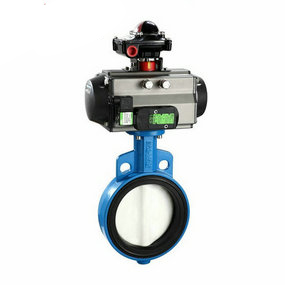How to determine which one is better for the closing speed of pneumatic ball valve? 1. When the upstream surface is corrosive medium, the gap can be sealed with sealing materials. See the waterproof casing atlas for the practice; Installation drawing of flexible waterproof sleeve (Type A).
2. Filler materials of flexible waterproof casing: asphalt hemp fiber, polystyrene board, PVC foam plastic board.
3. Sealing paste: polysulfide sealing paste, polyurethane sealing paste. 4. The dimensional tolerance and geometric tolerance of welding structure shall comply with JB/T5000.3-1998. Manual arc welding is adopted for welding, and the welding rod model is E4303, and the brand is J422. The basic shape and size of weld groove shall comply with GB985-88.
5. When flexible waterproof casing is rolled, the allowable deviation of perimeter is D2 ≤ 600, D2>600 ± 0.0035D2.
6. The thickness of the concrete wall where the wall passes through shall not be less than 300, otherwise the wall shall be thickened on one side or both sides, and the diameter of the thickened part shall be at least D5+200. 7. The weight of flexible waterproof casing shall be calculated with L=300. If the wall thickness is greater than 300, it shall be calculated separately.
8. If a non concrete wall is encountered at the place where the flexible waterproof casing passes through the wall, the concrete wall shall be used locally, and the pouring range shall be 200 larger than the wing ring diameter (D5). In addition, there are three connection modes for the pneumatic ball valve that must pour the casing at one time on the inner wall, including flange connection, clamp connection, etc. It can help solve the problem of pipe burst and damage to pipe connection equipment caused by thermal expansion and cold contraction. Before installing the pneumatic ball valve, place the pipe fittings at both ends of the valve on the horizontal plane. During installation, screw the pneumatic ball valve on one section of pipe fittings, and then screw the pipe fittings at the other end, always on the horizontal plane, to prevent the valve ball from being torn due to uneven force during installation. Next, tighten it by hand or wrench, After that, fix the pneumatic ball valve and pipe fittings at both ends on the object that is not easy to stretch or twist.
Pneumatic ball valve can also be called flexible pneumatic ball valve, pneumatic ball valve, pneumatic ball valve, flexible pneumatic ball valve, valve expansion joint, pneumatic ball valve, shock absorber, etc. It is a pipe connector with high elasticity, high air tightness, medium resistance and weather resistance. The pneumatic ball valve is generally composed of inner rubber layer, fabric reinforcement layer (reinforcement layer has multi-layer rubber scraped nylon cord fabric), middle rubber layer, outer rubber layer, end reinforced metal ring or steel wire ring, which is formed by high temperature and high pressure vulcanization and loosely combined with metal flange or parallel joint. This product makes use of the advantages of the valve, such as high elasticity, high air permeability, medium resistance, weather resistance and radiation resistance, which can reduce the vibration and noise of the pipeline and compensate for the expansion and contraction caused by temperature changes. The valve materials used vary according to the media, including natural rubber, styrene butadiene rubber, butyl rubber, butyl rubber, EPDM, neoprene rubber, silicon valve, fluorine valve, etc. It has the functions of heat resistance, acid resistance, alkali resistance, corrosion resistance, abrasion resistance, oil resistance, etc. Fast steps are not leaps, but continues; Slow pace is not slow, but wandering; A good road is not a road, but a broad one; The dangerous road is not a steep slope, but a trap; Great happiness is not to get, but to have; Good wealth is not money, but health; Great blessings are not for the future, but for the present.


